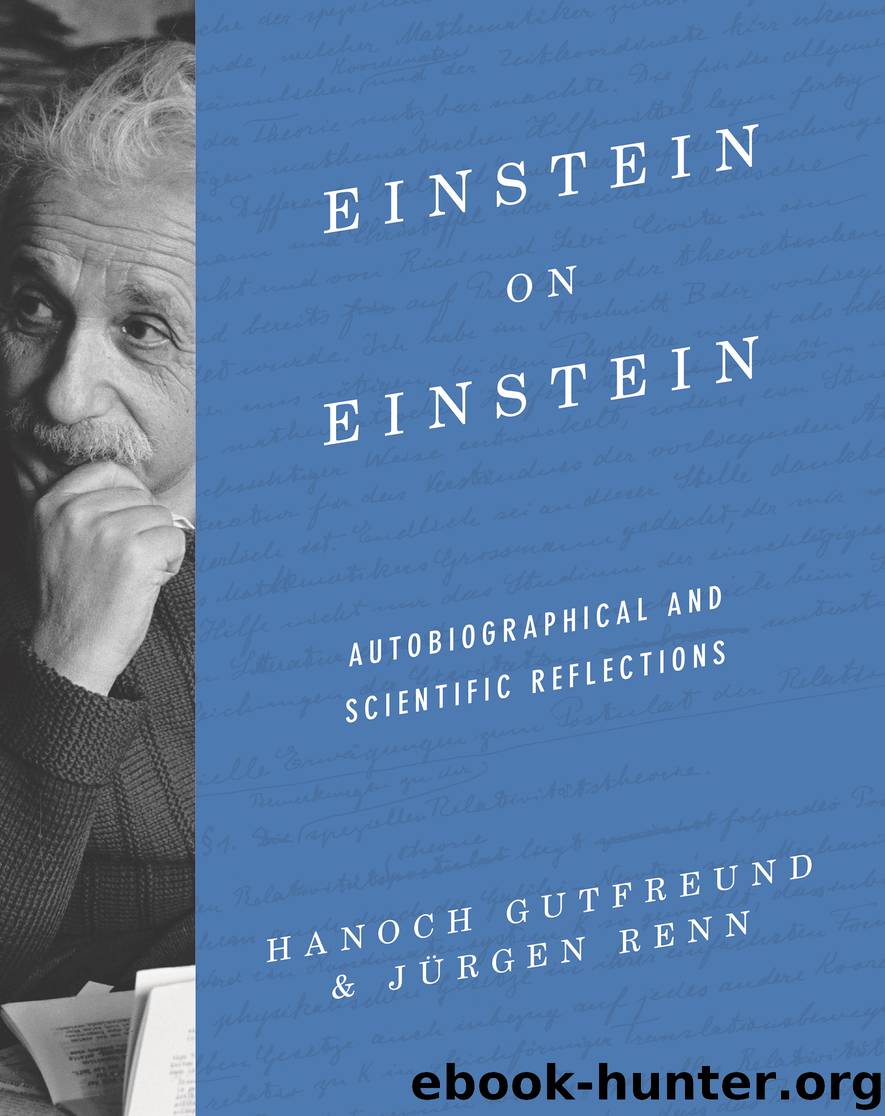Einstein on Einstein by Renn Jürgen; Gutfreund Hanoch;

Author:Renn, Jürgen; Gutfreund, Hanoch;
Language: eng
Format: epub
Publisher: Princeton University Press
Published: 2020-03-02T16:00:00+00:00
1
THE PHYSICISTS AND PHILOSOPHERS WHO CONTRIBUTED TO THE VOLUME
In his introductory remarks to Albert Einstein: Philosopher-Scientist, its editor, Paul Arthur Schilpp, asserts that Einstein’s Autobiographical Notes in itself assures the unique importance of the volume. He believed that the world would not possess the one and only intellectual autobiography of the illustrious scientist if the special nature of The Library of Living Philosophers (LLP) had not convinced Einstein to produce such an “obituary,” as he calls his autobiography. In line with the structure of all the books in the series, the volume on Einstein also features descriptive and critical essays by twenty-five contributors.
The first of these essays, by Arnold Sommerfeld, was not written specifically for the Einstein volume. It was published elsewhere as a tribute to Einstein on his seventieth birthday and reprinted in the LLP volume. Schilpp planned to issue the book on 14 March 1949, the day of Einstein’s birthday, but to his regret there was a slight delay in the publication.
Years later, describing the formative years of the LLP project, Schilpp recalled that Einstein, more than the other philosophers in this series, refused emphatically to have anything to do with the selection of contributors to his volume. He insisted that if the subject-philosopher participated in such a selection, it would violate the purpose of this series, namely, a free discussion between a philosopher and his critics and disciples.1
Among the essays of the contributors, Schilpp specifically emphasizes the significance of Niels Bohr’s account of his conversations and debates with Einstein on the epistemological aspects of physics, which came into being only owing to the peculiar nature of this series. Schilpp regrets, to the point of considering it a tragedy, that Max Planck was too seriously ill to be able to contribute an essay. He also regrets that Hermann Weyl, one of the most active mathematicians-physicists during the formative years of general relativity, was unable to fulfill his promise to write an essay on general relativity and motion. Schilpp mentions, without specifying their names, three other scholars who failed to fulfill their pledges to the editor. From Schilpp’s correspondence and earlier prospective lists of contributors, we know that two of them were the German mathematician Paul Epstein and the Russian physicist Yakov Frenkel.
Schilpp’s initial list of prospective contributors to the Einstein volume contained a number of prominent physicists and philosophers who, giving various reasons, rejected the invitation to participate.2 Among them we find the physicists Hans Bethe, Paul Dirac, Richard Feynman, Julian Schwinger, Erwin Schrödinger, the Indian-American astrophysicist Subrahmanyan Chandrasekhar, the Swiss-American astronomer Fritz Zwicky, and Einstein’s assistant in Princeton, Valentine Bargmann. The philosophers who did not accept Schilpp’s invitation are Bertrand Russell and Sir Edmund Whittaker. Schilpp tried several times, directly and with help of colleagues, to contact the Russian physicist Lev Landau, without any response whatsoever. It is not clear if his letters of invitation ever reached Landau.
In some cases, Schilpp corresponded with confirmed contributors on the subject and nature of their prospective essays and also in order to remind them of the deadlines for submission of their articles.
Download
This site does not store any files on its server. We only index and link to content provided by other sites. Please contact the content providers to delete copyright contents if any and email us, we'll remove relevant links or contents immediately.
The Complete Stick Figure Physics Tutorials by Allen Sarah(6638)
Secrets of Antigravity Propulsion: Tesla, UFOs, and Classified Aerospace Technology by Ph.D. Paul A. Laviolette(3445)
Thing Explainer by Randall Munroe(3327)
The River of Consciousness by Oliver Sacks(2992)
The Order of Time by Carlo Rovelli(2714)
I Live in the Future & Here's How It Works by Nick Bilton(2524)
A Brief History of Time by Stephen Hawking(2473)
How To by Randall Munroe(2473)
The Great Unknown by Marcus du Sautoy(2186)
What If?: Serious Scientific Answers to Absurd Hypothetical Questions by Randall Munroe(2170)
Blockchain: Ultimate Step By Step Guide To Understanding Blockchain Technology, Bitcoin Creation, and the future of Money (Novice to Expert) by Keizer Söze(2136)
Midnight in Chernobyl by Adam Higginbotham(2077)
Networks: An Introduction by Newman Mark(1997)
The Meaning of it All by Richard Feynman(1909)
Easy Electronics by Charles Platt(1864)
The Tao of Physics by Fritjof Capra(1848)
When by Daniel H Pink(1777)
Midnight in Chernobyl: The Untold Story of the World's Greatest Nuclear Disaster by Adam Higginbotham(1775)
Introducing Relativity by Bruce Bassett(1754)
